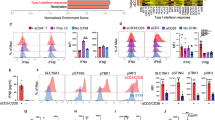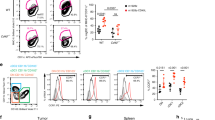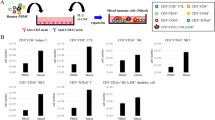Abstract
The advent of tyrosine kinase inhibitor (TKI) therapy markedly improved the outcome of patients with chronic-phase chronic myeloid leukemia (CML). However, the poor prognosis of patients with advanced-phase CML and the lifelong dependency on TKIs are remaining challenges; therefore, an effective therapeutic has been sought. The BCR–ABL p210 fusion protein’s junction region represents a leukemia-specific neoantigen and is thus an attractive target for antigen-specific T-cell immunotherapy. BCR–ABL p210 fusion-region-specific CD4+ T-helper (Th) cells possess antileukemic potential, but their function remains unclear. In this study, we established a BCR–ABL p210 b3a2 fusion-region-specific CD4+ Th-cell clone (b3a2-specific Th clone) and examined its dendritic cell (DC)-mediated antileukemic potential. The b3a2-specific Th clone recognized the b3a2 peptide in the context of HLA-DRB1*09:01 and exhibited a Th1 profile. Activation of this clone through T-cell antigen receptor stimulation triggered DC maturation, as indicated by upregulated production of CD86 and IL-12p70 by DCs, which depended on CD40 ligation by CD40L expressed on b3a2-specific Th cells. Moreover, in the presence of HLA-A*24:02-restricted Wilms tumor 1 (WT1)235–243 peptide, DCs conditioned by b3a2-specific Th cells efficiently stimulated the primary expansion of WTI-specific cytotoxic T lymphocytes (CTLs). The expanded CTLs were cytotoxic toward WT1235–243-peptide-loaded HLA-A*24:02-positive cell lines and exerted a potent antileukemic effect in vivo. However, the b3a2-specific Th-clone-mediated antileukemic CTL responses were strongly inhibited by both TKIs and interferon-α. Our findings indicate a crucial role of b3a2-specific Th cells in leukemia antigen-specific CTL-mediated immunity and provide an experimental basis for establishing novel CML immunotherapies.
This is a preview of subscription content, access via your institution
Access options
Subscribe to this journal
Receive 12 digital issues and online access to articles
$119.00 per year
only $9.92 per issue
Buy this article
- Purchase on Springer Link
- Instant access to full article PDF
Prices may be subject to local taxes which are calculated during checkout






Similar content being viewed by others
References
Deininger MW, Goldman JM, Melo JV . The molecular biology of chronic myeloid leukemia. Blood 2000; 96: 3343–3356.
Hochhaus A, O'Brien SG, Guilhot F, Druker BJ, Branford S, Foroni L et al. Six-year follow-up of patients receiving imatinib for the first-line treatment of chronic myeloid leukemia. Leukemia 2009; 23: 1054–1061.
Burchert A, Saussele S, Eigendorff E, Muller MC, Sohlbach K, Inselmann S et al. Interferon alpha 2 maintenance therapy may enable high rates of treatment discontinuation in chronic myeloid leukemia. Leukemia 2015; 29: 1331–1335.
Hehlmann R, Saussele S . Treatment of chronic myeloid leukemia in blast crisis. Haematologica 2008; 93: 1765–1769.
Experts in Chronic Myeloid Leukemia. The price of drugs for chronic myeloid leukemia (CML) is a reflection of the unsustainable prices of cancer drugs: from the perspective of a large group of CML experts. Blood 2013; 121: 4439–4442.
Kolb HJ . Graft-versus-leukemia effects of transplantation and donor lymphocytes. Blood 2008; 112: 4371–4383.
Snyder A, Makarov V, Merghoub T, Yuan J, Zaretsky JM, Desrichard A et al. Genetic basis for clinical response to CTLA-4 blockade in melanoma. N Engl J Med 2014; 371: 2189–2199.
Hacohen N, Fritsch EF, Carter TA, Lander ES, Wu CJ . Getting personal with neoantigen-based therapeutic cancer vaccines. Cancer Immunol Res 2013; 1: 11–15.
Cheever MA, Allison JP, Ferris AS, Finn OJ, Hastings BM, Hecht TT et al. The prioritization of cancer antigens: a national cancer institute pilot project for the acceleration of translational research. Clin Cancer Res 2009; 15: 5323–5337.
Bocchia M, Korontsvit T, Xu Q, Mackinnon S, Yang SY, Sette A et al. Specific human cellular immunity to bcr-abl oncogene-derived peptides. Blood 1996; 87: 3587–3592.
Yasukawa M, Ohminami H, Kaneko S, Yakushijin Y, Nishimura Y, Inokuchi K et al. CD4(+) cytotoxic T-cell clones specific for bcr-abl b3a2 fusion peptide augment colony formation by chronic myelogenous leukemia cells in a b3a2-specific and HLA-DR-restricted manner. Blood 1998; 92: 3355–3361.
Mannering SI, McKenzie JL, Fearnley DB, Hart DN . HLA-DR1-restricted bcr-abl (b3a2)-specific CD4+ T lymphocytes respond to dendritic cells pulsed with b3a2 peptide and antigen-presenting cells exposed to b3a2 containing cell lysates. Blood 1997; 90: 290–297.
Bosch GJ, Joosten AM, Kessler JH, Melief CJ, Leeksma OC . Recognition of BCR-ABL positive leukemic blasts by human CD4+ T cells elicited by primary in vitro immunization with a BCR-ABL breakpoint peptide. Blood 1996; 88: 3522–3527.
Pawelec G, Max H, Halder T, Bruserud O, Merl A, da Silva P et al. BCR/ABL leukemia oncogene fusion peptides selectively bind to certain HLA-DR alleles and can be recognized by T cells found at low frequency in the repertoire of normal donors. Blood 1996; 88: 2118–2124.
Bevan MJ . Helping the CD8(+) T-cell response. Nat Rev Immunol 2004; 4: 595–602.
Bos R, Sherman LA . CD4+ T-cell help in the tumor milieu is required for recruitment and cytolytic function of CD8+ T lymphocytes. Cancer Res 2010; 70: 8368–8377.
Steinman RM, Banchereau J . Taking dendritic cells into medicine. Nature 2007; 449: 419–426.
Liu TY, Uemura Y, Suzuki M, Narita Y, Hirata S, Ohyama H et al. Distinct subsets of human invariant NKT cells differentially regulate T helper responses via dendritic cells. Eur J Immunol 2008; 38: 1012–1023.
Tabata H, Kanai T, Yoshizumi H, Nishiyama S, Fujimoto S, Matsuda I et al. Characterization of self-glutamic acid decarboxylase 65-reactive CD4+ T-cell clones established from Japanese patients with insulin-dependent diabetes mellitus. Hum Immunol 1998; 59: 549–560.
He Y, Wertheim JA, Xu L, Miller JP, Karnell FG, Choi JK et al. The coiled-coil domain and Tyr177 of bcr are required to induce a murine chronic myelogenous leukemia-like disease by BCR/ABL. Blood 2002; 99: 2957–2968.
Zhang R, Liu T, Senju S, Haruta M, Hirosawa N, Suzuki M et al. Generation of mouse pluripotent stem cell-derived proliferating myeloid cells as an unlimited source of functional antigen-presenting cells. Cancer Immunol Res 2015; 3: 668–677.
Uemura Y, Senju S, Maenaka K, Iwai LK, Fujii S, Tabata H et al. Systematic analysis of the combinatorial nature of epitopes recognized by TCR leads to identification of mimicry epitopes for glutamic acid decarboxylase 65-specific TCRs. J Immunol 2003; 170: 947–960.
Uemura Y, Liu TY, Narita Y, Suzuki M, Nakatsuka R, Araki T et al. Cytokine-dependent modification of IL-12p70 and IL-23 balance in dendritic cells by ligand activation of Valpha24 invariant NKT cells. J Immunol 2009; 183: 201–208.
Ono A, Hattori S, Kariya R, Iwanaga S, Taura M, Harada H et al. Comparative study of human hematopoietic cell engraftment into BALB/c and C57BL/6 strain of rag-2/jak3 double-deficient mice. J Biomed Biotechnol 2011; 2011: 539748.
Arden B, Clark SP, Kabelitz D, Mak TW . Human T-cell receptor variable gene segment families. Immunogenetics 1995; 42: 455–500.
Wiesel M, Oxenius A . From crucial to negligible: functional CD8(+) T-cell responses and their dependence on CD4(+) T-cell help. Eur J Immunol 2012; 42: 1080–1088.
Bennett SR, Carbone FR, Karamalis F, Miller JF, Heath WR . Induction of a CD8+ cytotoxic T lymphocyte response by cross-priming requires cognate CD4+ T cell help. J Exp Med 1997; 186: 65–70.
Ridge JP, Di Rosa F, Matzinger P . A conditioned dendritic cell can be a temporal bridge between a CD4+ T-helper and a T-killer cell. Nature 1998; 393: 474–478.
Schoenberger SP, Toes RE, van der Voort EI, Offringa R, Melief CJ . T-cell help for cytotoxic T lymphocytes is mediated by CD40-CD40L interactions. Nature 1998; 393: 480–483.
Hantschel O, Rix U, Superti-Furga G . Target spectrum of the BCR-ABL inhibitors imatinib, nilotinib and dasatinib. Leuk Lymphoma 2008; 49: 615–619.
Burchert A, Wolfl S, Schmidt M, Brendel C, Denecke B, Cai D et al. Interferon-alpha, but not the ABL-kinase inhibitor imatinib (STI571), induces expression of myeloblastin and a specific T-cell response in chronic myeloid leukemia. Blood 2003; 101: 259–264.
Fujiki F, Oka Y, Tsuboi A, Kawakami M, Kawakatsu M, Nakajima H et al. Identification and characterization of a WT1 (Wilms Tumor Gene) protein-derived HLA-DRB1*0405-restricted 16-mer helper peptide that promotes the induction and activation of WT1-specific cytotoxic T lymphocytes. J Immunother 2007; 30: 282–293.
Boise LH, Minn AJ, Noel PJ, June CH, Accavitti MA, Lindsten T et al. CD28 costimulation can promote T cell survival by enhancing the expression of Bcl-XL. Immunity 1995; 3: 87–98.
Redmond WL, Sherman LA . Peripheral tolerance of CD8 T lymphocytes. Immunity 2005; 22: 275–284.
Schreiber RD, Old LJ, Smyth MJ . Cancer immunoediting: integrating immunity's roles in cancer suppression and promotion. Science 2011; 331: 1565–1570.
Cai A, Keskin DB, DeLuca DS, Alonso A, Zhang W, Zhang GL et al. Mutated BCR-ABL generates immunogenic T-cell epitopes in CML patients. Clin Cancer Res 2012; 18: 5761–5772.
Schurch C, Riether C, Amrein MA, Ochsenbein AF . Cytotoxic T cells induce proliferation of chronic myeloid leukemia stem cells by secreting interferon-gamma. J Exp Med 2013; 210: 605–621.
Mumprecht S, Schurch C, Schwaller J, Solenthaler M, Ochsenbein AF . Programmed death 1 signaling on chronic myeloid leukemia-specific T cells results in T-cell exhaustion and disease progression. Blood 2009; 114: 1528–1536.
Wehner R, Wendisch M, Schakel K, Bornhauser M, Platzbecker U, Mohr B et al. Imatinib mesylate does not impair the immunogenicity of human myeloid blood dendritic cells. Leukemia 2006; 20: 1629–1632.
Caccia D, Micciche F, Cassinelli G, Mondellini P, Casalini P, Bongarzone I . Dasatinib reduces FAK phosphorylation increasing the effects of RPI-1 inhibition in a RET/PTC1-expressing cell line. Mol Cancer 2010; 9: 278.
Al-Alwan MM, Rowden G, Lee TD, West KA . The dendritic cell cytoskeleton is critical for the formation of the immunological synapse. J Immunol 2001; 166: 1452–1456.
McNab FW, Ewbank J, Howes A, Moreira-Teixeira L, Martirosyan A, Ghilardi N et al. Type I IFN induces IL-10 production in an IL-27-independent manner and blocks responsiveness to IFN-gamma for production of IL-12 and bacterial killing in Mycobacterium tuberculosis-infected macrophages. J Immunol 2014; 193: 3600–3612.
Nishimura T, Kaneko S, Kawana-Tachikawa A, Tajima Y, Goto H, Zhu D et al. Generation of rejuvenated antigen-specific T cells by reprogramming to pluripotency and redifferentiation. Cell Stem Cell 2013; 12: 114–126.
Qasim W, Thrasher AJ . Progress and prospects for engineered T cell therapies. Br J Haematol 2014; 166: 818–829.
Acknowledgements
CSII-EF, pCMV-VSV-G-RSV-Rev and pCAG-HIVgp were kindly provided by Dr H Miyoshi (RIKEN BioResource Center, Tsukuba, Japan). The cDNA encoding HLA-DRB1*09:01 (DR9) was kindly provided by Dr H Kobayashi (Asahikawa Medical College, Asahikawa, Japan). This study was performed as a research program of the Project for Development of Innovative Research on Cancer Therapeutics (P-DIRECT), Ministry of Education, Culture, Sports, Science and Technology of Japan. This study was supported by grants from Nagono Medical Foundation, the National Cancer Center Research and Development Fund (25-A-7) and the Takeda Science Foundation.
Author information
Authors and Affiliations
Corresponding authors
Ethics declarations
Competing interests
Shin Kaneko is a founder, shareholder and scientific adviser at AsTlym Co., Ltd. Hitoshi Kiyoi received research funding from Bristol-Myers Squibb, Chugai Pharmaceutical Co. Ltd., Kyowa Hakko Kirin Co. Ltd., Zenyaku Kogyo and Fujifilm Corporation. The remaining authors declare no conflict of interest.
Rights and permissions
About this article
Cite this article
Ueda, N., Zhang, R., Tatsumi, M. et al. BCR–ABL-specific CD4+ T-helper cells promote the priming of antigen-specific cytotoxic T cells via dendritic cells. Cell Mol Immunol 15, 15–26 (2018). https://doi.org/10.1038/cmi.2016.7
Received:
Revised:
Accepted:
Published:
Issue Date:
DOI: https://doi.org/10.1038/cmi.2016.7
Keywords
This article is cited by
-
Aerobic glycolysis enables the effector differentiation potential of stem-like CD4+ T cells to combat cancer
Cellular & Molecular Immunology (2024)
-
Phase I/II clinical trial of a Wilms’ tumor 1-targeted dendritic cell vaccination-based immunotherapy in patients with advanced cancer
Cancer Immunology, Immunotherapy (2019)



